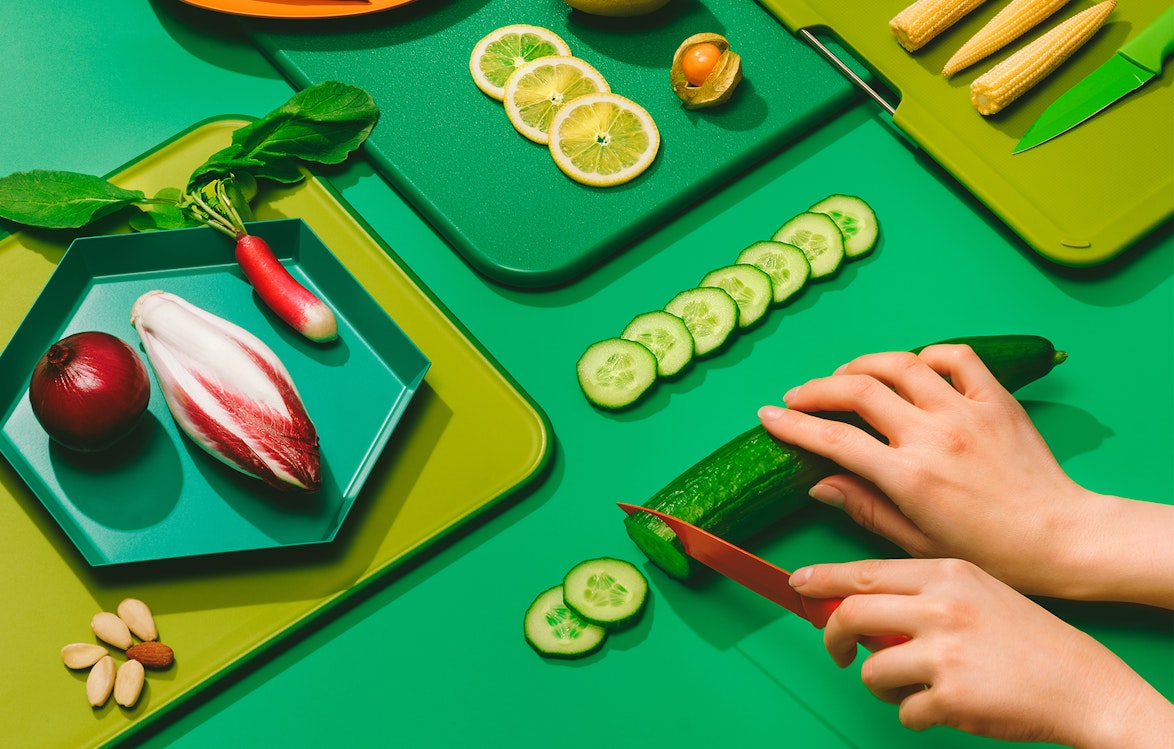Time to read : 3 min
The plant-based grocery list
We do our groceries on autopilot 9 out of 10 times. If you want to eat more plant-based, it's a good idea to make a switch. Take our plant-based shopping list with you next time. Everything you need is on it.
Vegetables
Vegetables are packed with important vitamins, minerals, and dietary fiber. And they're also low in calories. Super healthy! To live a healthy life, the advice is to eat at least 250 grams of vegetables per day.
Green vegetables are especially healthy and offer various health benefits (1, 2). Make sure to have these products at home.
- Kale
- Cauliflower
- Broccoli
- Chinese, white, and green cabbage
- Lettuce
- Spinach
- Brussels sprouts
But other vegetables are also very healthy, of course! You can buy them individually or in a convenient mixed bag.
- Eggplant
- Beets
- Mushrooms
- Zucchini
- Bell pepper
- Pumpkin
- Carrot
Make sure to not keep fresh vegetables for more than 2 to 5 days. This way, all the nutrients are preserved. Or go for frozen vegetables! Frozen vegetables are cheaper and are often seen as less healthy. But this is unjustified. Freezing is actually a very good and natural way to keep the quality of the vegetables optimal without losing nutrients. Just do it!
Fruit
Fruit is tasty and healthy. The advice is to eat at least 200 grams of fruit per day. That's about two servings - like an apple and a banana. It's important to vary, so you get different vitamins, minerals, and dietary fiber. If you're also watching your weight, it's smart to eat fruits with low sugar content.
Fresh fruit is the best and ideal as a healthy snack in between!
- Apple
- Banana
- Blueberries
- Grapes
- Pear
- Peach
- Kiwi
- Orange
It's also smart to get dried fruit. It lasts a long time and is delicious as an ingredient in, for example, a soy yogurt breakfast.
- Apricots
- Dates
- Goji berries
- Raisins
- Figs
Frozen fruit is just as healthy as fresh fruit. But often cheaper and longer lasting. Frozen fruit is ideal for making delicious smoothies or smoothie bowls. Mmm
Tubers
Tubers are rich in fibers, especially in the peel. Additionally, they contain a good form of carbohydrates, various B and C vitamins, potassium, calcium, and phosphorus (4). Super healthy! Especially if you eat them with the peel.
- Potato
- Sweet potato
- Soy products
When you eat completely plant-based, it can be challenging to get enough calcium because it's mainly found in dairy products. Choose soy products enriched with calcium, such as:
- Soy milk
- Soy yogurt
- Tempeh
- Tofu
- Whole grains
As a child, you probably heard it: brown bread is healthier than white bread. That's because whole-grain products contain more vitamins, minerals, and dietary fiber. Whole-grain products are a good source of iron, zinc, and proteins.
- Oats
- Whole-grain bread
- Rye bread
- Whole-grain pasta and spaghetti
Also, consider pseudocereals. These are seeds of plants that are not grains but can be used in the same way as grains. An extra advantage is that they are gluten-free.
- Amaranth
- Buckwheat
- Quinoa
Legumes
Legumes are real all-rounders! They are rich in fiber, healthy carbohydrates, proteins, B vitamins, and minerals such as iron and selenium.
- Kidney beans
- Chickpeas
- Lima beans
- Lentils
- Split peas
- Black and white beans
